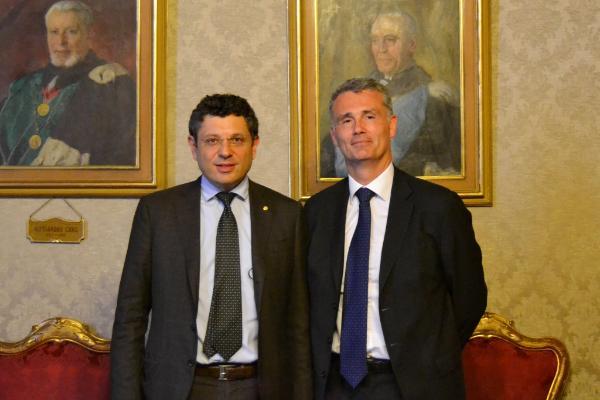
- Modernisation and expansion of five regional campuses
- Energy efficiency and earthquake protection improvements for buildings
- Largest loan to an Italian university to date
The EU bank is supporting the five-year investment plan of the University of Bologna with an overall financial commitment of EUR 130m. This covers over half of the planned works, which total EUR 222m. The European Investment Bank (EIB) loan signed today in Bologna will go towards modernising and expanding the university's campuses, with a series of works ranging from earthquake protection to the energy efficiency of buildings and the upgrading of classrooms, research laboratories and sports facilities. There are a total of 16 different projects spread across the five campuses of the Alma Mater (as the university is called) – in Bologna, Forlì, Cesena, Ravenna and Rimini – with works covering an area of around 130 000 m2.
The University of Bologna is the oldest university in Europe (founded in 1088) and with 80 000 students is Italy's second biggest after La Sapienza in Rome.
This is the largest loan the EIB has granted to an Italian university to date, and falls within its traditional areas of activity (support for innovation and human capital) with a climate action element (energy efficiency improvements for buildings). The financing will have a 20-year maturity with favourable interest rates facilitated by the international markets-based fund-raising methods used by the EIB, whose bonds have AAA ratings from the main ratings agencies.
“We are particularly proud of this operation at the EIB, as financing university development plans is the best way to provide long-term support to the country. Only by investing in education can we give the students of our universities the opportunity to be on the cutting edge of all European and global scientific sectors and contribute to social and economic progress,” said EIB Vice-President Dario Scannapieco.
Director General of the University of Bologna Marco Degli Esposti said: “The EIB financing for the university's investment plan provides important recognition for the soundness of the assets on our balance sheet, and for the quality of our strategies, as well as for their suitability for generating sustainable social and economic development in our area. The EIB appraisals for granting the loan assessed and valued not only its sustainability for Alma Mater's balance sheet, but also the social impact of the university's planned investments, mainly in terms of job creation for qualified young people, in line with EU priorities. We are particularly pleased to receive recognition from such an unquestionably prestigious and rigorous institution as the EIB, and this will encourage us as we move forward with our projects.”

Photographer: Marco Santarelli ©EIB
Download original